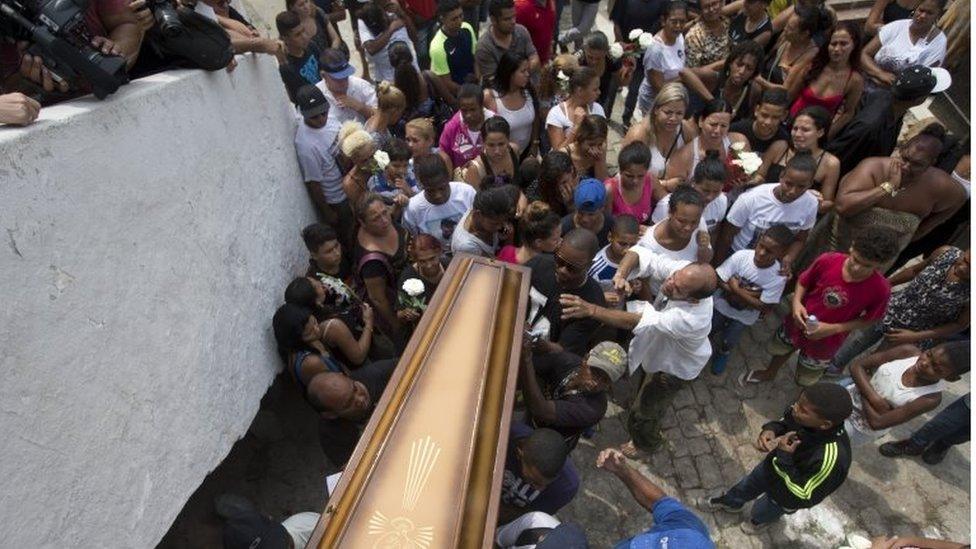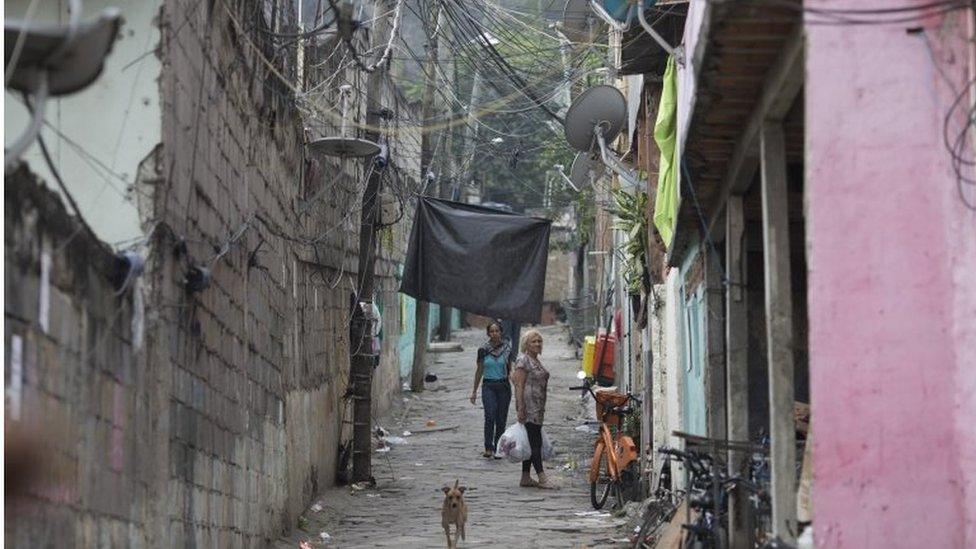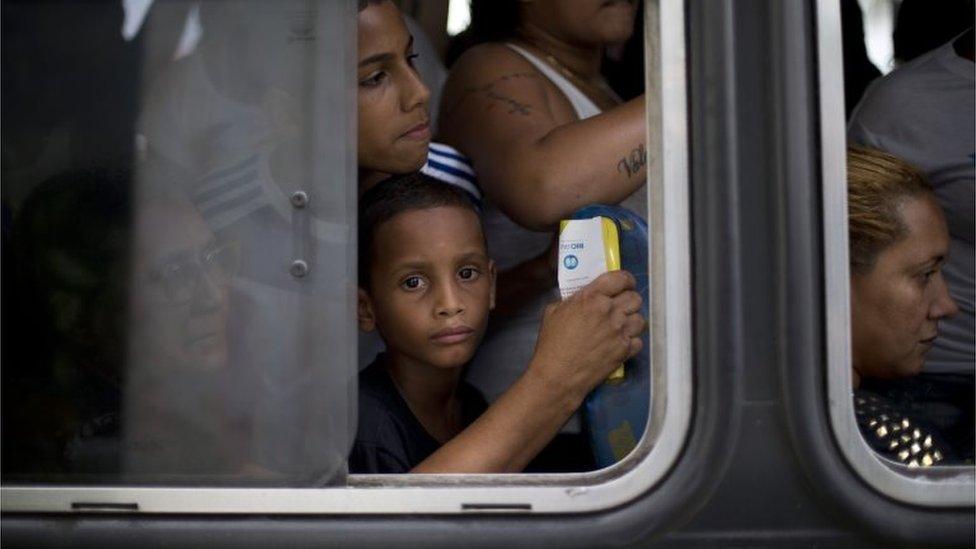Rio de Janeiro: Beguiling, beautiful and brutal
- Published
- comments

Mourners condemned Eduardo Victor's killing, but police say he was shot in self-defence
Beguiling, beautiful and brutal.
Rio de Janeiro is all of the above.
Perhaps it's the physical nature of the "Marvelous City" that everything seems to be so close together - the ugly and the serene, rich and poor, violent and peaceful.
The death of 17-year-old Eduardo Felipe Victor dos Santos might have gone down as one more barely noticed statistic in the long-running war between Rio's military police and the city's many drugs gangs.
At Eduardo's funeral in the sprawling Sao Joao Batisita cemetery, just a stone's throw from the upmarket air-conditioned shopping centres and tourist hotspots, mourners had arrived on buses from Providencia favela - or shanty town - where Eduardo lived and died.
The air was heavy with emotion, the dead youth's mother and grandmother inconsolable as they watched his coffin being slid into a small space in the cemetery wall.
A family friend made a brief but impassioned speech, saying that had it not been for images taken furtively on a mobile phone, by someone who witnessed Eduardo's death, the shocking truth might never have come out.
The widely shared footage clearly shows a group of armed policemen standing over the youth's heavily bloodstained body.
Five Brazilian police officers have been taken into custody for allegedly altering a crime scene
One of the officers calmly places a gun on the floor and then into Eduardo's hand. The officer then fires the pistol into the air twice, presumably to give the impression that Eduardo had shot at police before being killed.
The five-man police team has since been arrested and Rio's high profile chief of security, Jose Mariano Beltrame, has vowed that any rogue officers will be dismissed and prosecuted.
Trigger happy?
When I recently asked Mr Beltrame if Rio had a problem with officers who "shoot first and ask questions later", his denial was emphatic.
"That's not true. If you look, we have figures that show the number of police killings, and those are falling," the secretary told me in his downtown Rio office.
But he added: "Yes, we used to have 'cops who kill', but today you can only say that in a few cases."

Eduardo Felipe Santos Victor lived in the Providencia favela, or shanty town (pictured)
Human rights groups like Amnesty International dispute the official explanation. In a recent report, Amnesty accused Rio's military police of being "trigger happy" and said that more than 1,500 murders in the city over the last five years were committed by on-duty police officers.
Whether deliberately targeted or killed in crossfire, the fact that hundreds of people die every year at the hands of Rio's police is arguably another sign that the so called "pacification" policy in the city's favelas is fast unravelling.
With more than 50,000 violent deaths every year, Brazil has one of the highest murder rates in the world.
About half of those killed are young black men and, according to the Institute of Public Security, many cities including Rio have seen a big increase this year in the number of people killed "as a result of policy activity".
Many Brazilians say you can't look at what is happening in a huge, diverse country through the prism of one city alone.
All eyes on Rio
That is a fair point, but it's a matter of fact that there's huge international focus on Rio these days because of its international reputation, last year's World Cup and the forthcoming Olympic Games.
So, given the recent figures, does Mr Beltrame envisage serious security problems in Rio between now and the Games?
"I obviously don't have a crystal ball, so I can't guess what's going to happen," is his first answer, but then he expands.
"Actually, I think it's the opposite. We're going to have a very peaceful Olympics Games, like many of the events we organised before. But the Olympics are not my main worry. My main concern is the people of Rio that don't want and can't carry on with this amount of guns around."

Large crowds followed Eduardo Victor's coffin to his funeral service on Wednesday
That last point is significant. Mr Beltrame occupies a powerful and high-profile position, but says he has no political ambitions and so feels free to speak his mind.
He clearly thinks there are too many guns in circulation in the city, fuelling the drugs wars between the numerous gangs (three distinctive "big" gangs identified by him) and police.
"It can't go on like this," says the secretary, who advocates much tougher gun control and a serious debate about the legalisation of drugs.
Police targeted
The focus this week may have been on another troubled young man who died at the hands of police, arguably when he could and should have been detained alive, whether or not he was involved in selling drugs in his favela.
But Rio's security forces, too, are frequently the victims of violent crime, retribution and murder.
Earlier this week, a policeman on the outskirts of the city was tortured to death, his body dragged through the streets behind a horse.
There have been numerous kidnappings of officers from their cars and homes, and living in the communities where they work is often not an option for policemen and women concerned about their families' safety.
Rio de Janeiro is still one of the world's great cities and, as was the case with the World Cup, it will probably get its act together in time to put on a great Olympic Games.
But with less than a year to go before those Games arrive, these stories - of police violence and impunity, of murder committed against the police, and of heavily armed gangs controlling favelas - are not images of a city at peace with itself.